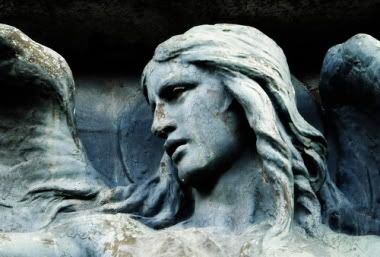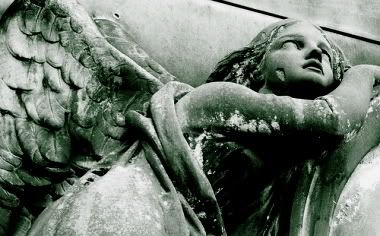
On this Michaelmas day, I am posting my lecture for this evening's St Michael's Conference Southwest Reunion (or as I like to call it, "Mini-Mike's") at St Francis in Dallas. Enjoy.
I believe in Angels, not because of that cheesy song, but because divine revelation (which we find in Catholic tradition, particularly in the Holy Bible) tells us that these spiritual beings exist as an invisible part of God’s created order.
The topic of angels has become increasingly popular in American culture. Much of the current popularity springs from interest in such things as New Age spirituality with its spirit guides and near death experiences. Our “post-modern” culture has begun to search for the spiritual dimensions of life which modern cultural materialism cannot provide. With so many new books on angels, how are we to tell fact from fiction? What do Scripture and Tradition have to say?
Let's go over some basic facts about angels. Angels are pure spirits created by God. It was God who created all things, both “visible and invisible,” as we say in the Nicene Creed. The angels were created in vast numbers by God and (it seems likely) before he made humans.
Contrary to popular belief, angels are not dead humans. That was part of the storyline of the movie It's a Wonderful Life and the television series Highway to Heaven. But that's not the way things really are; you don't become an angel when you die any more than you become a horse or a car or a tree. You remain who you were created to be: a human being. Likewise, angels are not pre-incarnate humans (that is, babies waiting to be born). Angels do not become humans and humans do not become angels.
The Bible tells us they were made without sex (neither male nor female) and so in Christian art they are often depicted as looking neither particularly male or female. Since they are neither male nor female it follows that they do not procreate; they are never born and they never die or cease to exist.
While they are beings of pure spirit and have no physical bodies, thus they are normally invisible, they can by God’s power assume a physical form in order to accomplish a particular mission. The angelic spirits are arranged in a hierarchy of form and function. While the angels are pure spirits of consciousness and will as is God, they are not omnipotent, omniscient, nor omnipresent like God.
That is important to remember because so often we hear these attributes—all present, all knowing, and even seemingly all powerful—being attributed to angels, even to Lucifer, the chief fallen angel. But he is nothing of the sort (no, the devil didn't make you do it) and neither is any other angel. The devil is not present everywhere, he does not know everything, and far from being all powerful, Satan is more like a beaten dog, and Michael, the standard bearer, is charged with keeping him at bay.
Yet, because of their nature, we should note that the angels do have abilities and virtues far beyond perhaps even the saints in heaven. Because they are not physical, it follows that they are not bound by physical limitations. For the faithful angels, their will is in total conformity with their faculty of reason. Thus, they are sinless. Of course, many of the angels fell from this high estate with the rebellion led by Lucifer, the most exalted of the angels. God made the angels free to choose to love or not love. And some of the angels did not choose wisely.
John Milton, in Book II of his epic poem Paradise Lost, presents a vivid portrait of this moment of rebellion. In his mind, Lucifer (through his own pride) became absorbed in self-love and conceived of Sin, his daughter, who burst forth from the left side of his head, a gory mess, the blood-soaked offspring of a vain mind. Looking at his daughter Sin, the devil lusted after her and raped her. She conceived and gave birth to her brother Death. In turn, Death lusted after his sister Sin, and violated her by his own incestuous rape. Now, she sits by the infernal gates and gives birth to the hounds of hell, who forever torment her by eating out her bowels.
I think Milton got it right. Could there ever be a more vivid depiction of the depravity of sinful self-love? Of course, the rebellion spawned by the jealousy and pride of Satan was defeated by the Archangel Michael and all the hosts of heaven (Rev 12:7-12). Unlike us, the fallen angels or demons, enjoy no possibility of redemption. The Revelation of St. John the Divine tells us that they were expelled from heaven and cast down to earth where they assault the brethren and do their best to thwart the will of God.
They know their time is short before the last judgment and that God will have the final victory. They also know that the power of God is always stronger that the forces of darkness. Through prayer, grace, and the intercession of angels, we have God’s protection against the crafts and assaults of the devil.
Many more angels remained faithful to God than rebelled against him. They serve their creator and carry out his good will toward humans. Angels are higher than us (closer to God) according to nature as beings of pure spirit. Thus, according to Hebrews 2:9, Christ was “made a little lower than the angels” when incarnated in human flesh. However, we are higher than the angels (closer to God) according to grace and our adoption as his children and temples of his Spirit. Therefore angels serve humankind as agents of Jesus’ salvation.
Angels also serve us as mediators and protectors. From Jesus’ allusion to angels in Matthew 18:10, we conclude that a guardian angel likely watches over each person, and elsewhere in the scriptures we are told that they guard the nations. But they also carry out God’s judgment upon nations (see 2 Kings 19).
Angels mediate prayers and graces. In Genesis, the patriarch Jacob saw a ladder or “stairway to heaven” with angels going up and down between heaven and earth (Gen 28:12; Jn 1:51). It seems likely that they are carrying things to and fro, or at least going back and forth with a purpose. Angels bring us assistance, protection, and grace from God. In St John’s Revelation, we also see that they take our prayers and offerings back up to God’s throne in heaven (Rev 8:3). At the end of earthly life, angels lead the holy souls into paradise, as they led the soul of the poor beggar Lazarus to Abraham’s bosom (Luke 16:22).
In the history of theology, these hosts of heaven were determined to be ordered in what we commonly call the “nine choirs of angels.” These are divided into three triads (that is, three groups of three).
The first angelic triad continually worships God in his immediate presence. These spirits consist of the exalted love of the fiery seraphim or "fires," the complete intuition of the cherubim or "mighty ones," and the perfect power of the ophanim or “thrones.” The primary function of their being is to be present in the heavenly court and to attend to the perpetual adoration and praise of the divine substance.
The second triad extends this divine praise and love to the creation. The spiritual dominions, princedoms, and powers execute the love, knowledge, and power of God relative to the general structure, order, and governance of the cosmos.
The last triad serves the divine love towards humans when the virtues, the angels, and the ruling archangels, come to serve and care for people on earth. Angels then truly become “messengers” of divine favor.
It was the Archangel Gabriel who gave the message of the Incarnation to the blessed Virgin Mary at the Annunciation. Two other archangels are mentioned in Scripture. As the prince of the Seraphim, the mighty St. Michael led the heavenly host in the battle against the rebelling spirits, casting them out of heaven. He delivers the message of Defeat to God’s enemies and Victory to us. St. Raphael the Archangel delivered Tobias’ wife from demonic obsession. You can find the story in the Book of Tobit in the Apocrypha. Raphael is also commonly associated with the angelic trembling of the healing waters in the pool of Bethesda (Jn 5:2-4). He delivers the message of healing and reconciliation.

Overall, the heavenly hierarchy moves from the freedom and might of contemplative adoration (by the seraphim, cherubim, and ophanim) through principled order and sovereignty (ruled by the dominions, princedoms, and powers) to active service toward others in a spirit of compassion and care (by the virtues, archangels, and angels).
The earthly life was designed to follow this cosmic harmony. We were created to enjoy complete and perfect goodness in returning thanks to the source of our happiness. Our worship must mirror heaven. The fullness of our being is to join in the heavenly chorus which forever sings: “Holy, holy, holy is the Lord God Almighty” (Rev 4:8).
Inspired by his love, we must care for the creation entrusted to us, and reach out to others in service. Like the angels of heaven, God wants us to minister to him at his altar and minister to out in the world as his messengers to creation.
Isaiah 6:1-8
In the year that king Uzziah died I saw also the LORD sitting upon a throne, high and lifted up, and his train filled the temple. Above it stood the seraphim: each one had six wings; with twain he covered his face, and with twain he covered his feet, and with twain he did fly. And one cried unto another, and said, Holy, holy, holy, is the LORD of hosts: the whole earth is full of his glory. And the posts of the door moved at the voice of him that cried, and the house was filled with smoke. Then said I, Woe is me! for I am undone; because I am a man of unclean lips, and I dwell in the midst of a people of unclean lips: for mine eyes have seen the King, the LORD of hosts. Then flew one of the seraphim unto me, having a live coal in his hand, which he had taken with the tongs from off the altar: And he laid it upon my mouth, and said, “Lo, this hath touched thy lips; and thine iniquity is taken away, and thy sin purged.” Also I heard the voice of the Lord, saying, “Whom shall I send, and who will go for us?” Then said I, “Here am I; send me.”


No comments:
Post a Comment